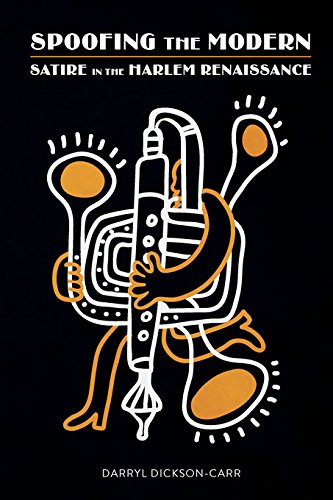An examination of satirical texts from the first major African American literary movement
Spoofing the Modern is the first book devoted solely to studying the role satire played in the movement known as the "New Negro," or Harlem, Renaissance from 1919 to 1940. As the first era in which African American writers and artists enjoyed frequent access to and publicity from major New York-based presses, the Harlem Renaissance helped the talents, concerns, and criticisms of African Americans to reach a wider audience in the 1920s and 1930s. These writers and artists joined a growing chorus of modernity that frequently resonated in the caustic timbre of biting satire and parody.
The Harlem Renaissance was simultaneously the first major African American literary movement of the twentieth century and the first major blooming of satire by African Americans. Such authors as folklorist and anthropologist Zora Neale Hurston, poet Langston Hughes, journalist George S. Schuyler, writer-editor-poet Wallace Thurman, physician Rudolph Fisher, and artist Richard Bruce Nugent found satire an attractive means to criticize not only American racism, but also the trials of American culture careening toward modernity. Frequently, they directed their satiric barbs toward each other, lampooning the painful processes through which African American artists struggled with modernity, often defined by fads and superficial understandings of culture.
Dickson-Carr argues that these satirists provided the Harlem Renaissance with much of its most incisive cultural criticism. The book opens by analyzing the historical, political, and cultural circumstances that allowed for the "New Negro" in general and African American satire in particular to flourish in the 1920s. Each subsequent chapter then introduces the major satirists within the larger movement by placing each author's career in a broader cultural context, including those authors who shared similar views. Spoofing the Modern concludes with an overview that demonstrates how Harlem Renaissance authors influenced later cultural and literary movements.
Darryl Dickson-Carr, an associate professor of English at Southern Methodist University, is the author of The Columbia Guide to Contemporary African American Fiction, which won a 2006 American Book Award, and African American Satire: The Sacredly Profane Novel.
"Charm does not often come to mind when discussing works of literary criticism, but Daryl Dickson-Carr's delightful Spoofing the Modern vivifies the role of humorous social critique during the height of the New Negro era, and his lively prose makes little compromise with the drier conventions of academic writing."—Project Muse
"In situating a quintet of 'African American iconoclasts squarely in the center of scholarly discourse' about the Harlem Renaissance, Darryl Dickson-Carr has cast new light onto noteworthy literary developments from the 1920s to the present. In doing so, he reinforces Aristophanes's assertion that while satire may not please, it nevertheless can speak the truth."—Derek C. Maus, associate professor of English and communications, The State University of New York at Potsdam
